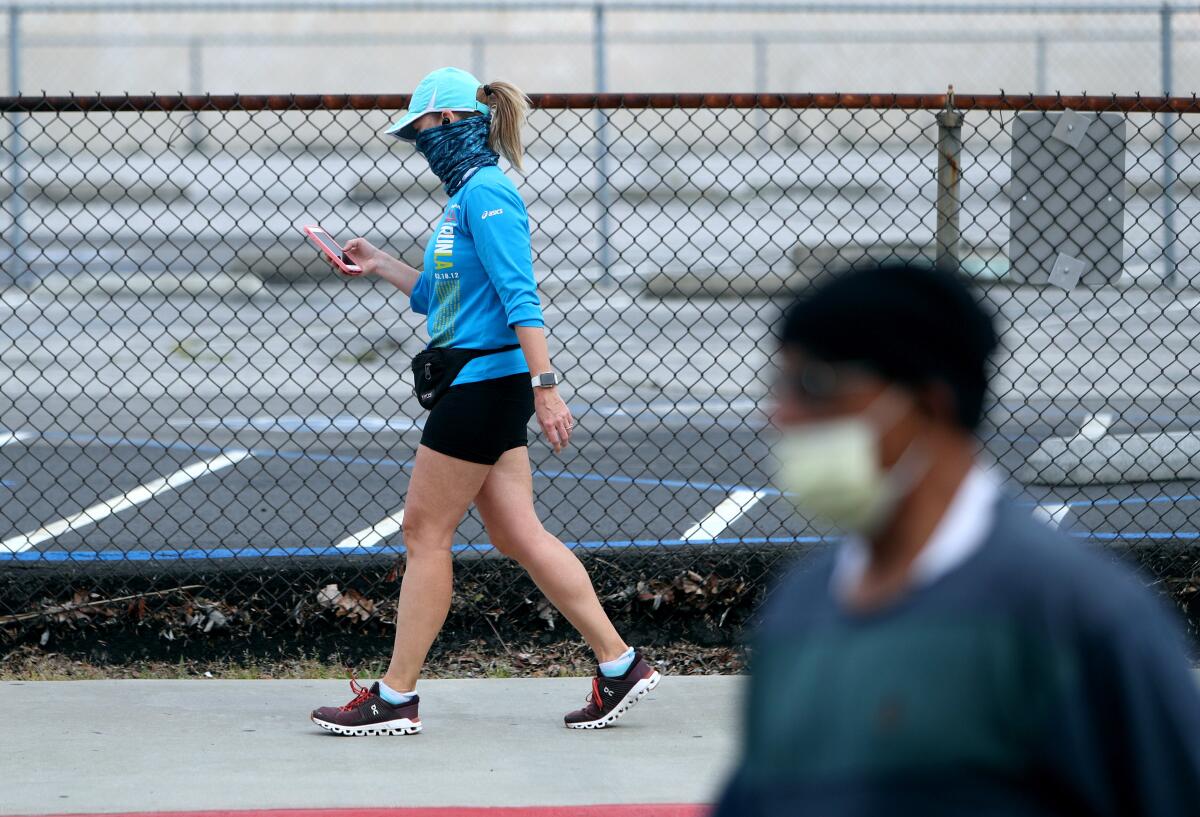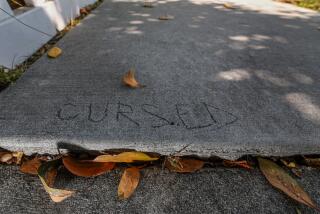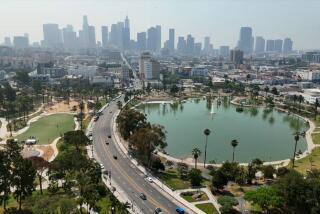Editorial: Hey, Mayor Garcetti, L.A. needs more street space for walking

- Share via
Here’s an urban challenge: Say you reside in one of Los Angeles’ densest neighborhoods, such as Koreatown, East Hollywood or Palms, with more than 20,000 people per square mile. You’re staying home and doing your part to flatten the coronavirus curve.
But what happens when you and your 20,000-plus neighbors try to take a walk or jog in the neighborhood? There’s not enough space on the narrow sidewalk to stay six feet from other pedestrians. You have to zigzag into the street. But watch out for the speeding car! Back on the sidewalk. It’s still crowded. Try the grassy parkway. Just don’t step in that dog poop…. Oh, too late.
Angelenos shouldn’t have to navigate this social distancing obstacle course. There’s plenty of lightly used space available at this very moment that could be dedicated to exercise and the pursuit of fresh air. It’s right there, in the middle of the street.
Taking advantage of the dramatic drop in traffic now that most people are hunkered down at home, more cities are temporarily closing streets to cars to create more space for people to get out and exercise. Oakland Mayor Libby Schaaf has begun to turn 74 miles of roadway into “Slow Streets” that are closed to through traffic. Each road is still open to emergency vehicles and local residents who have to use that street to reach their homes or jobs. Minneapolis and St. Paul closed off portions of roads near parks and lakes so people could safely enjoy the outdoors.
So, Mayor Eric Garcetti, what about Los Angeles? Surely this city has some streets that can be closed to create more open space.
Last week Councilman Mike Bonin asked the Department of Transportation to work with his office to create neighborhood slow zones and a “temporary emergency safe streets network,” which could include closing lanes to cars on some streets and banning through traffic entirely on others. As in Oakland, locals could still use such streets to drive to and from their homes.
Kudos to Bonin for taking the lead with his Westside district. But there are communities across the city that crave more space to exercise, walk the dog or take the baby for a stroll safely. That means having enough room to allow proper social distancing. It also means having the comfort of walking or allowing children to bike in the street without worrying that a driver will come barreling down the road.
Angelenos love their open spaces. Sometimes too much. Crowding at the beaches and hiking trails last month led the mayor and other regional leaders to close those beloved amenities to help slow the spread of COVID-19.
Won’t road closures just draw crowds of people to bask in the freedom of streets without cars? It’s certainly a risk. That’s why the city should provide an ample number of closed streets for neighborhoods so that people have enough room to spread out, rather than cluster in the rare open space.
L.A. has a mixed record on street transformation, but COVID-19 creates an unprecedented opportunity to experiment. Before, ambitious projects to slow speeding cars and make streets safer for pedestrians and bicyclists were dropped after commuters complained. Now? It’s quite possible that walkers and bikers outnumber drivers at the moment. There’s a constituency of homebound people desperately craving outdoor space.
Maybe people will love their slow streets and pedestrian thoroughfares so much that they’ll want to keep them after the coronavirus stay-at-home orders are lifted. Perhaps there will be more support for the idea of reclaiming public space from vehicles. It shouldn’t take a pandemic. Los Angeles, like every other city, needs to redesign its streets so it is easier and safer for people to walk, bike and take transit, and to dramatically cut climate-warming emissions.
Angelenos have done a good job so far staying home. Now, Mayor Garcetti, do us a solid: Close some streets.
More to Read
A cure for the common opinion
Get thought-provoking perspectives with our weekly newsletter.
You may occasionally receive promotional content from the Los Angeles Times.









